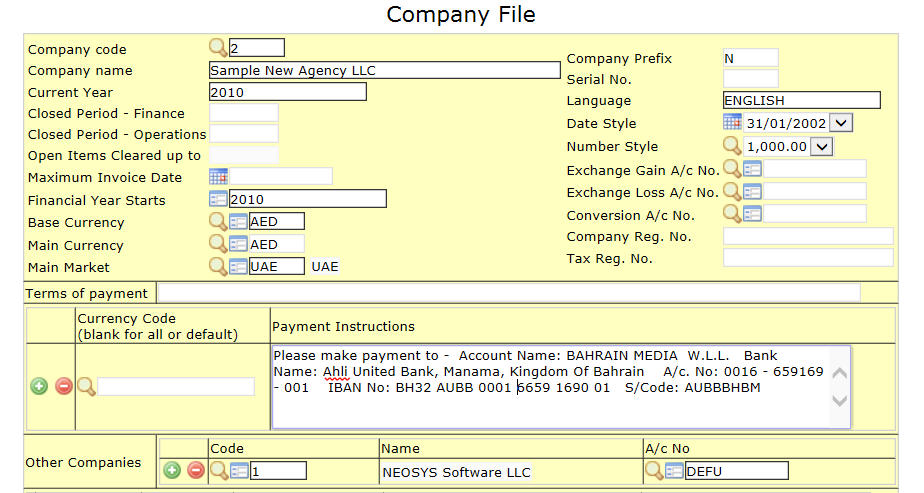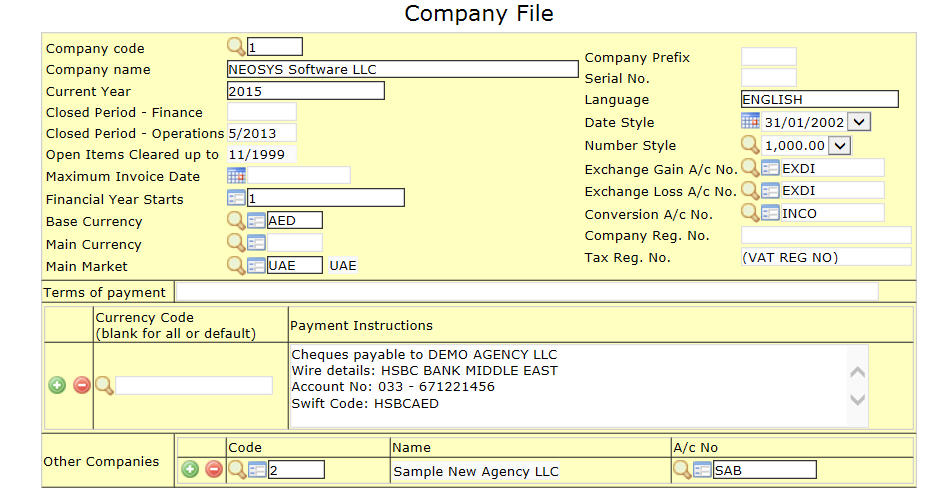Setting up a new company in existing/new database
From NEOSYS User Support Wiki
Setting up a new company in existing/new database
Draft email requesting info required to add new company to existing/new database
For an existing database, first go through the Client System and find out how companies have been created and the exact information required to create a new company. If there is a need to draft an email to the client then edit the following template according to the info required.
Dear XXX,
To open the new company can we please have the following info:
1.Letterhead:
-Exact company name to appear on invoices etc
-Company logo (image about 100 pixels high and proportionally wide saved as jpg or gif file with no margins inside the file).
Logo will not be ACCEPTED if it does not follow the above format. Please follow the format to avoid reformatting in future.See (http://userwiki.neosys.com/index.php/Agency_FAQ#Can_I_resize_images_to_use_in_letterhead_for_NEOSYS_documents.3F)
-Address for letterhead
2.Any new users:
-Full Name
-Email Address (to get passwords)
-User role(s) department/position etc (for authorization level)
3.Existing Users Access Rights:
-Who should have access to the new company?
4. Default Market for the Company
5.Bank Accounts:
-Full Payment instructions
6.First Financial Year
7.General Accounts:
-Client: Shared existing list ? OR create new private clients list/chart?
-Suppliers: Share existing list? OR create new private supplier list/chart?
8.Invoice Numbering:
-Prefix for the new company (usually one letter)
-The numbering system for the following documents ( Refer to Principles of Document numbering in NEOSYS :- http://userwiki.neosys.com/index.php/Setting_up_and_Configuring_NEOSYS_Agency_System#Principles_of_Document_Numbering_in_NEOSYS )
Media module (if installed and not using default numbering scheme)
Starting Schedule Number
Starting Media Invoice Number
Job module (if installed and not using default numbering scheme)
Starting Job Number
Starting Purchase Order Number
Starting Estimate Number
Starting Job Invoice Number
Finance module (if installed and not using default numbering scheme)
What numbering scheme to be used?
** In addition to the points above, ask for the following information if setting up a new company in a new database
9. Base Currency of the dataset
10. IP restrictions:
List of IP numbers from which NEOSYS can be accessed
11. Backup email notification recipients:
List of people to receive email reports about the daily backup
12. Allowed domains in email addresses
List of allowed domains for user's email addresses
Best Regards,
Setting up a new company in an existing database
The following procedure also applies to adding a new company to a multi-company installation in existing database.
- Letterhead - to be configured using the usual setup details at Configuring Letterhead
- Create a new company in the Company File by specifying the required details like company code, company name, current year, main market code, prefix, financial year. The company code must be a letter even if previous existing companies use a numeric company code. Specify an alphabetical prefix to the company which is used for invoice numbering (refer to Converting database to "invoice numbering per company" for more details on configuring invoice numbering per company). Enter payment instructions specific to this company and it will appear on all invoices for this company.

- If you need inter-company entries to be made then the first step is to setup the existing and new company ledgers accounts under the Inter-company A/cs Ledger. This is required if you have only one bank a/c in the main company and the other companies operate out of the main company's bank a/c and/or need to do inter-company entries or if the other companies are just dummy ones. See Inter Company entries
To enable inter-company entries, in the main company file specify the other company code and its inter-company a/c number under Other Companies.
- In the Chart of Accounts lock the Bank Ledger to the main company and create an additional bank ledger for the new company if there is a need. You can also create additional ledgers for Sales/Purchase/AR/AP/TC/TD and lock the existing ones to the earlier company. However mostly these ledgers are shared between companies. In no instance will you unlock the Bank Ledger to be shared between the companies. Since you can have multiple subsidiary ledgers under one control account, you can operate a mixture of common accounts (i.e. across all companies) and private accounts for any particular company. Accounts may be moved between charts of the same the control a/c to segregate the accounts into common or private charts.
- Journal Setup – Add any new private ledgers where necessary otherwise posting will be disallowed
- Create New users for the Company in the Authorisation file. Assign appropriate access rights for the existing users for the new company.
- Configure starting number for the new company under Media/Jobs>Invoice>Invoice Numbering and numbering pattern under the Media/Job config file.
Setting up a new company in a new database
In addition to the steps under Setting up a new company in an existing database, the following has to be done when setting up a new company in a NEW database
- Configure base currency of the new database in the Company file
- Client Security Mark - ask the programmer to setup the client security mark for the new company.
- IP restrictions: Add list of IP numbers from which NEOSYS can be accessed from in the System Configuration file and Authorisation file. Refer Access Restriction in NEOSYS
- Backup email notification recipients and allowed domains in email addresses: Configure list of people to receive email reports about the daily backup and list of allowed domains for user's email addresses in System Configuration file.